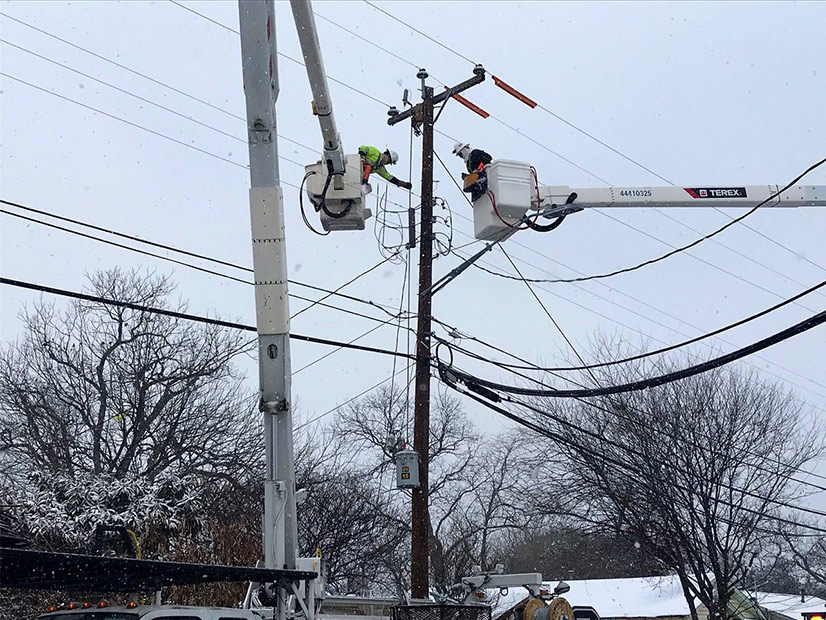CPS Energy is celebrating a pair of victories in its battle with ERCOT over the nearly $50 billion in market transactions during the February winter storm.
A Bexar County district court on May 21 agreed with the San Antonio municipal utility that it has the legal right to sue ERCOT over the grid operator’s alleged “serious violations of Texas law, Texas statutes, contractual obligations and the Texas State Constitution.” ERCOT claimed sovereign immunity in asking the court to dismiss the case and allow the proceedings to take place before the Texas Public Utility Commission.
The same court on May 21 also rejected ERCOT’s request to change the proceeding’s venue to Travis County, where the grid operator is headquartered. Instead, the case will continue to be litigated in Bexar County, where San Antonio is located (2021CI04574).
Judge Solomon Casseb issued his decisions in two single-page orders after hearing oral arguments from both parties.
“Tuesday’s ruling underscores the strength of CPS Energy’s case against ERCOT, and I look forward to the people of San Antonio having an opportunity to hold ERCOT accountable for its errors during and after the storm,” San Antonio Mayor Ron Nirenberg said in a statement issued by CPS.
“What ERCOT did was wrong, and it continues to refuse to correct its own acknowledged errors, including roughly $16 billion in illegitimate charges,” CPS CEO Paula Gold-Williams said. “CPS Energy looks forward to continuing to fight for our Greater San Antonio customers and Texans across the state.”
ERCOT has claimed sovereign immunity as the lawsuits have piled up following the storm, noting it is funded by generators’ transaction fees. The Texas Supreme Court in March declined to rule on an appellate ruling granting ERCOT immunity from lawsuits. (See Texas Supremes Sidestep Ruling on ERCOT Lawsuit Shield.)
The grid operator said the appeals court “clearly demonstrated” its sovereign immunity and said it expects the Texas high court to “ultimately … confirm this.”
“ERCOT is neither concerned nor surprised by the recent Bexar County ruling,” spokesperson Leslie Sopko said. “Lawsuits like this only increase costs, which are ultimately passed on to all Texas end-use customers, including CPS Energy’s own customers.”
CPS in April obtained a temporary restraining order that prevents ERCOT from “taking posted collateral to cover the charges that other market participants have not paid.” (See “CPS Energy Gains Restraining Order,” Regulators, ERCOT Stakeholders ‘Meet’ for First Time.)
“A city-owned utility cannot be asked to unlawfully extend its credit to help settle the debts of other entities, especially in cases where there is no chance of being repaid,” CPS said.
CPS is the nation’s largest public utility, providing service to more than 884,000 electric and 366,000 natural gas customers.
It is also involved in 17 lawsuits with gas suppliers over $700 million in bills. The utility on Wednesday issued another statement from Gold-Williams accusing Enterprise Products Partners of “predatory price gouging” by inflating its natural gas prices by as much as 12,000% during the storm. She said CPS has already paid Enterprise $36.5 million, but the gas supplier is suing to collect nearly $100 million more.
“Enterprise held these exorbitant prices in place knowing full well that public utilities, such as CPS Energy, had no choice but to continue to buy,” Gold-Williams said. “CPS Energy’s legal positions are based on longstanding legal doctrines, deeply rooted in Texas law: Price gouging during a declared disaster is a violation of public policy, and the exorbitant prices charged by Enterprise are unenforceable because they are unconscionable.
“We at CPS Energy will not pass the higher, unlawful part of the charges to our customers only to further fatten Enterprise Products’ bottom line.”






